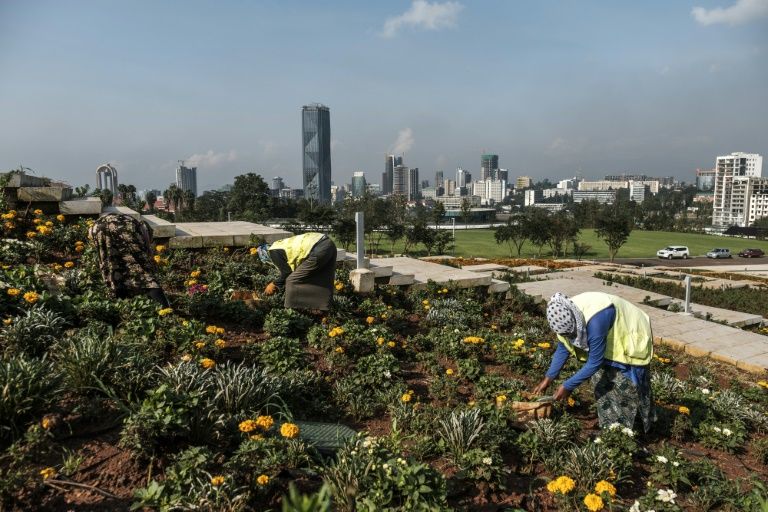For the past year, workers have been busy transforming a disused plot of land down the hill from Ethiopian Prime Minister Abiy Ahmed’s office into a park showcasing his political vision.
The 48-hectare Friendship Square is rich in symbolism promoting unity: A fountain syncs with the patriotic hit song “Ethiopia” and an elevated speaker’s platform is flanked by 76 araucaria trees — one for each ethnic group represented in the upper house of parliament.
Yet one year after Abiy won the Nobel Peace Prize, there are mounting worries this unity message is ringing hollow.
Grisly inter-ethnic violence persists, especially in Abiy’s home Oromia region.
Police and soldiers are increasingly resorting to lethal force against demonstrators.
And several opposition leaders have been locked up on terrorism charges, casting doubt on whether landmark elections expected next year will represent a true break with Ethiopia’s authoritarian past.
Amid the turbulence, Abiy has paid careful attention to Friendship Square, often visiting the site late at night to take stock of progress, according to aides.
His press secretary Billene Seyoum told AFP the park and other beautification sites in Addis Ababa are “representations of how fast we can engage in projects, turn them around and deliver them for public utilisation”.
That approach, though, echoes former Ethiopian leaders who rushed to put their stamp on the capital, shunting aside other voices, said Biruk Terrefe, a researcher at Oxford who has studied Abiy’s development ambitions.
“The decision-making around these urban projects has been reminiscent of past administrations. Many of the city’s urban planners were sidelined.”
– Unrest at home –
Abiy was appointed prime minister in 2018 after years of anti-government protests and his 2019 Nobel win seemed to briefly revive the “Abiymania” of his first months in office.
But two weeks later, security woes began to resurface.
Jawar Mohammed, a former media mogul and one-time Abiy ally, accused the government of trying to orchestrate an attack against him.
The claim sparked anti-Abiy protests in Addis Ababa that descended into inter-ethnic violence and left scores dead throughout Oromia.
The incident highlighted divisions between Abiy, Ethiopia’s first Oromo leader, and Oromo nationalists like Jawar who say the PM is a poor champion of their interests.
More recently, Oromo pop star Hachalu Hundessa was shot dead in June, sparking further unrest that claimed more than 160 lives in Oromia and Addis Ababa.
More than 9,000 people were rounded up in mass arrests, including opposition leaders like Jawar and Bekele Gerba.
Their supporters took to the streets to denounce their arrests, prompting security forces to take drastic action, with deaths reported in 13 locations in Oromia over a spate of just a few days in August, according to the Ethiopian Human Rights Commission.
– A stalled peace process –
The Nobel primarily honoured Abiy’s push for peace with neighbouring Eritrea, which had been a sworn enemy of Ethiopia’s since a brutal border war broke out in 1998.
Abiy maintains warm public relations with Eritrean President Isaias Afwerki, but attempts to build on their rapprochement have been complicated by the Tigray People’s Liberation Front (TPLF), which dominated Ethiopian politics before Abiy and remains in command in Ethiopia’s northern Tigray region.
